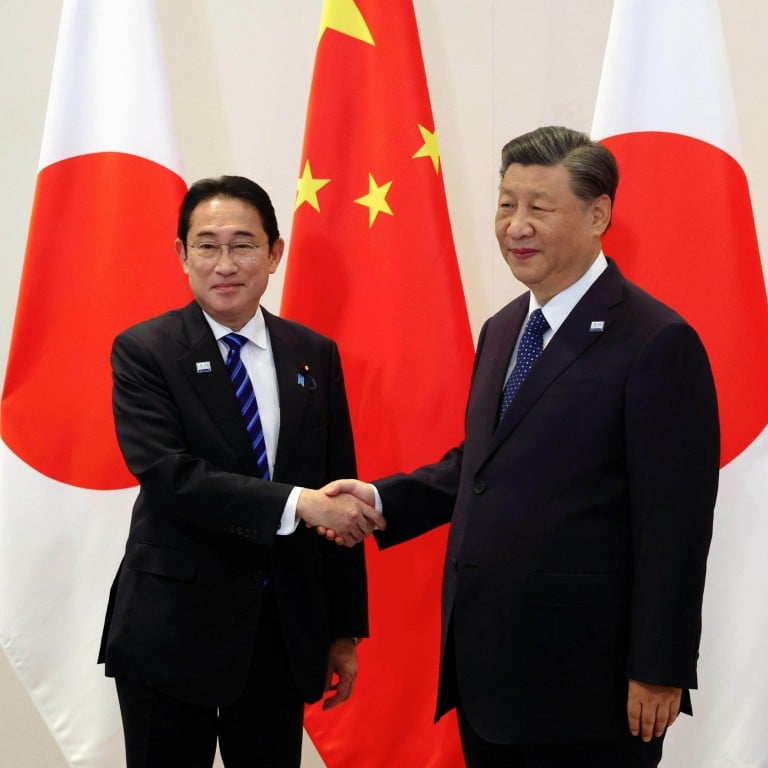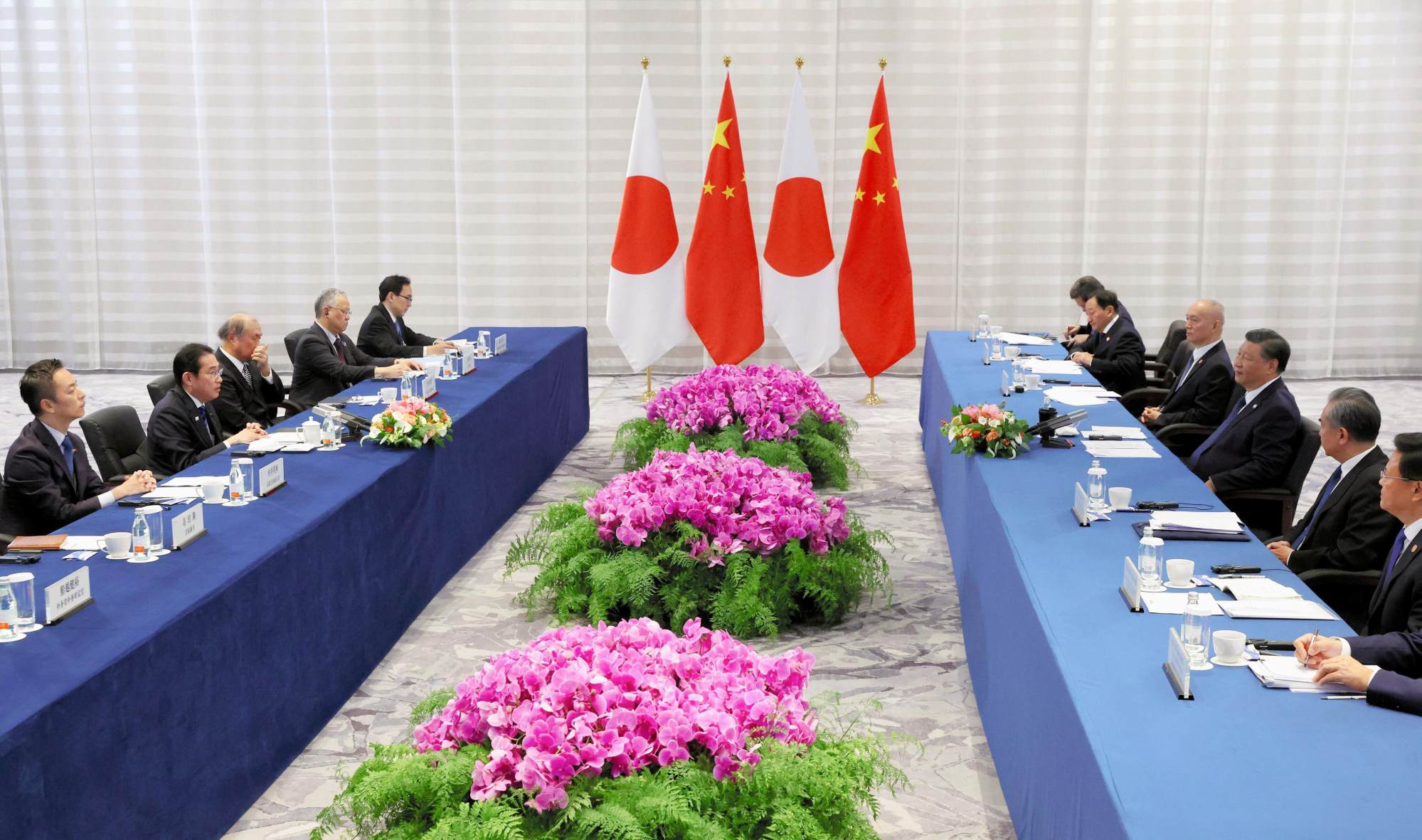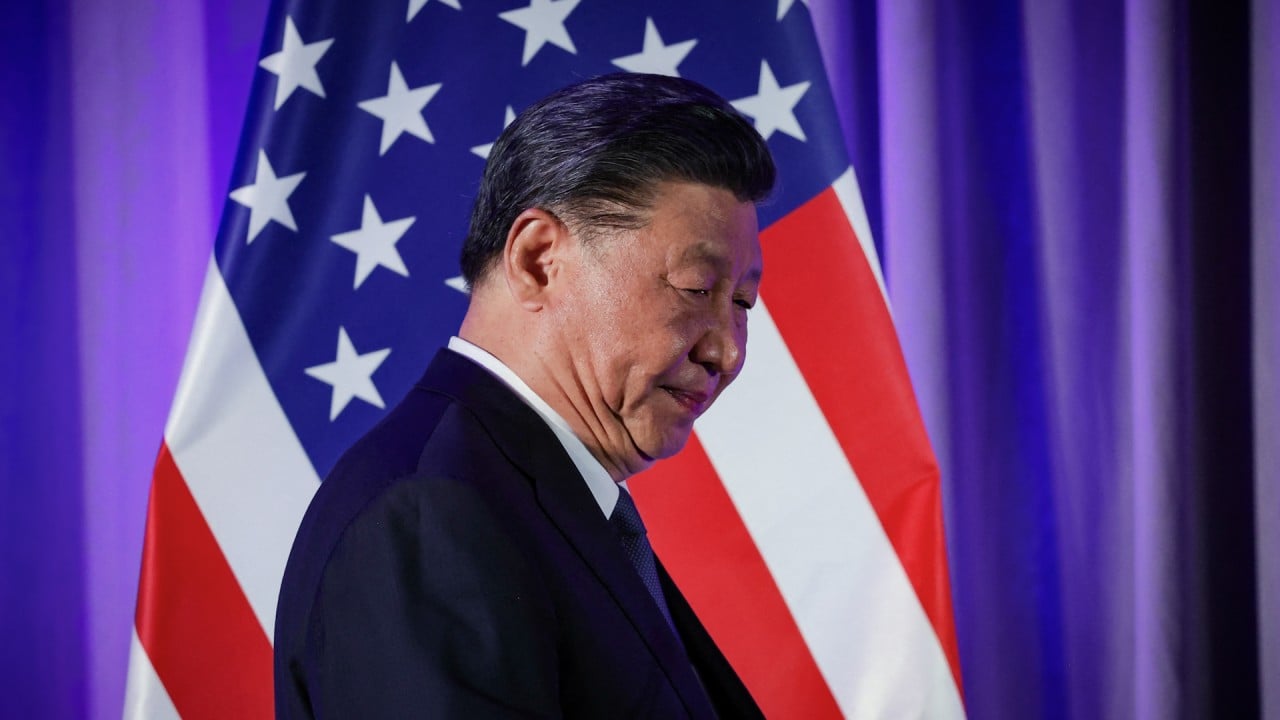
Apec 2023: China, Japan leaders pledge to ‘coexist peacefully’, manage differences in first meeting in a year
- Xi Jinping tells Fumio Kishida both sides should ‘properly handle differences’
- Complexity of relations between the two countries ‘far exceeds’ that of US-China ties, analyst says
After the 65-minute summit with Xi, Kishida told reporters: “We agreed on where we are heading. That is to build constructive and stable relations.”
Their talks on Friday morning, on the sidelines of the annual Asia-Pacific Economic Cooperation (Apec) summit in San Francisco, occurred a day after Xi and US President Joe Biden held a much-anticipated meeting to stabilise their increasingly volatile ties. It was part of the Chinese leader’s charm offensive to shore up relations with Indo-Pacific leaders and counter the US-led efforts to encircle Beijing.
Observers said Xi’s meeting with Kishida was important for both countries, and for regional stability since Beijing’s relations with Tokyo were “even more complex” than the deeply strained China-US ties.
China ‘willing to work with Japan to relive spirit’ of 1978 peace treaty
In opening remarks, Xi said both countries should “properly handle differences” and reaffirm their strategic ties, while Kishida said they should work together and “coexist and prosper as neighbours”, despite their differences.
According to the Chinese readout by the official Xinhua news agency, Xi urged Japan to honour its past commitments on Taiwan and historical issues and “ensure the foundation of Sino-Japanese relations is not damaged or shaken”.
He also called on Tokyo to deepen cooperation with Beijing and distance itself from Washington on China-related economic security issues, stressing that both their economic interests and their industrial and supply chains were “deeply intertwined”.
“It is in no one’s interest to engage in ‘small yard, high fence’ and ‘decoupling and breaking chains’,” he said.
Both Xi and Kishida pledged to hold high-level talks on economic issues and welcomed the launch of a new framework to discuss export controls.
According to Xi, bilateral ties “have generally maintained a momentum of development”, despite ups and downs over the past 45 years.
“At a time when the international situation is marked by changes and challenges … China-Japan relations are at a critical period of carrying forward the past and ushering in the future,” he said.
“Both sides should grasp the general trend of history, grasp the correct direction, in the spirit of ‘taking history as a mirror and opening up the future’, … objectively and rationally look at each other’s development, set up a positive and friendly perception of each other, and constructively manage contradictions and differences,” Xi was quoted as saying.
“The political consensus of ‘treating each other as partners and posing no threat to each other’ should be reflected in concrete policies and practical actions.”

Kishida told Japanese television networks that he “expressed our serious concerns over China’s increasing military activity near Japan, including its collaboration with Russia”, and “stressed again the extreme importance of peace and stability in the Taiwan Strait for the international community, including Japan”.
Kishida also urged Xi to immediately drop bans on Japanese seafood imports imposed after the Fukushima water release.
“Regarding the discharge of treated … water into the ocean, I strongly demanded a calm response based on scientific evidence and the immediate removal of restrictions on imports of Japanese food products,” Kishida said after the meeting.
But according to Xinhua, Xi did not appear to budge on the issue, which has further strained relations. China opposed Tokyo’s move in late August, issuing a sweeping ban on all seafood imports from Japan and taking the highly-charged issue to the United Nations, amid soaring anti-Japanese sentiment in China.
“The discharge of nuclear-contaminated water from Japan’s Fukushima into the sea has a bearing on the health of all human beings, the global marine environment and international public interests. The Japanese side should take seriously the legitimate concerns at home and abroad and handle the matter properly in a responsible and constructive manner,” the Chinese leader said.
The encounter between the two leaders came a day after Xi, on his first US trip in more than six years, agreed with Biden to steady US-China relations, resume military-to-military communications and cooperate on fentanyl and climate change.
“Against this backdrop, Japan also needs to moderate ties with China,” he said.
He noted Takeo Akiba, special adviser to the Japanese cabinet and secretary general of Japan’s National Security Secretariat, met Chinese Foreign Minister Wang Yi in Beijing last week to set the stage for the Xi-Kishida meeting.
“It’s more of a tactical change after China and the US tried to ease their tensions. The complexity of China-Japan relations far exceeds that of the US-China relations,” he said, largely because of long simmering territorial and history disputes.
Kishida and Xi last met during the Apec meeting in Bangkok a year ago in what had been the first face-to-face meeting between leaders of the two countries in three years. But despite their intentions to mend ties, relations between the Asian rivals continued to decline, particularly after the Kishida administration unveiled Japan’s new defence strategy in December, setting a more assertive tone for Japan’s China policy.
Chinese imports of Japanese carp halt after authorities fail to renew paperwork
With an eye on Beijing’s growing military and political assertiveness, Kishida hosted a China-focused Group of Seven summit in May and actively sought closer security ties with regional countries that also have territorial disputes with Beijing, such as the Philippines, Vietnam and India.
Beijing and Tokyo have also traded jabs over the escalating tensions surrounding Japanese-controlled islands in the East China Sea, accusing each other of infringing on their maritime territory.
Shi Yinhong, a professor of international relations at Beijing’s Renmin University, said while a leadership summit was helpful to stabilise the situation, it may not play a decisive role in changing the direction of their ties.
“China and Japan are sharply opposed strategically and ideologically, and in terms of hi-tech and seafood boycotts, and other issues, and I don’t think there will be a fundamental change because of this summit meeting, which failed to produce breakthroughs,” he said.
“There were many leadership and high-level meetings in the last 10 years, but they have mostly been followed by increased confrontation,” he said.
China and Japan had resumed high-level military communication months ago due to frequent and dangerous military encounters between the two countries in the East China Sea and the Sea of Japan, Shi said.
Liu said that it would be hard to see fundamental improvements in bilateral ties unless Japan changed its national defence strategy – which he said views China as its biggest security threat – and also moderated its support for the independence-leaning government in Taiwan.
“Japan cannot just make some tactical moves to match adjustments in US-China ties, but should transform ties with China from confrontational to win-win cooperation and peaceful coexistence,” he said.


